| Sendedatum | 2008-12-27 16:35:14 |
|---|---|
| Ausgabe | 73 |
hier eine weitere Ausgabe des beliebten Newsletters für Masochisten und Weltuntergangssekten. Je nach Newsreader kann die Darstellung weniger als perfekt befriedigend sein, daher könnte sich ein Blick auf die Onlineversion lohnen, die außerdem verschlagwortet ist.
Inhaltsverzeichnis:
- Zimbabwes Währung
- Moskauer Zeitung druckt nichts als Bankrottanzeigen
- Neues von der IKB
- UK: Hypothekenvergabe
- Mass. pension fund off $16.1b
- USA: Retail Sales Plummet
- Asset Price Declines, Wealth Destruction, and Federal Borrowing / Bailouts
- Chinas Erfolge bei der Stärkung der Binnennachfrage
- Dubai "demonstrating the emirate’s strength"
- Pakistan: Aktienmarkt
- Saudi-Arabien: Aktienmarkt
- Some U.S. Meat Plants Lose Right to Export to Mexico
- Südkorea: Ausblick für 2009
- Mikroelektronik: Taiwan und Japan
- Micron: Quartalsverlust
- Rußland: Null-Ausfuhrzölle auf Nickel und Kupfer-Kathoden
- UK: Big brother is NOT watching you: Cash-strapped towns leave CCTV cameras unmonitored
- Toys ‘R’ Us to stay open round the clock
- The Coming Oil Train Wreck -- First stop: Mexico?
- USA: Hotelauslastung
- Länderdomino: Ukraine
- USA: Sparquote
- Japan’s Recession Deepens as Factory Output Plummets
- Low Mortgage Rates, Few Qualify
- GMAC ist nun eine Bank
- Fedex CEO calls for new tax policy to stabilize economy
- USA: Shoplifters of the World Unite
- Nepal: Stromversorgung
- Pemex Oil Production Drops 6.5% on Cantarell Field
Inhalt:
Blog reader Ben Saltsman sent us this photo of a restroom sign in South Africa, which hints at one use for Zimbabwe’s severely devalued currency:

Moskau - Mit einer ungewöhnlichen Initiative hat der "Kommersant" am Samstag auf die wachsende Dramatik der Finanzkrise in Russland hingewiesen. Die Moskauer Tageszeitung verzichtete komplett auf journalistische Beiträge und druckte stattdessen auf 36 Seiten Bankrotterklärungen russischer Unternehmen.
Das hat ähnliches Potential wie 137 Seiten Zwangsvollstreckungen.
Russlands Wirtschaft ist von den Folgen der Finanzkrise stark betroffen. Die Rating-Agentur Standard & Poor's schätzt, dass die Wirtschaft des Riesenreichs im Jahr 2009 um 2,5 Prozent schrumpfen wird, 2010 gar um vier Prozent. Hunderttausende Russen verlieren bereits jetzt ihre Jobs. Moskaus jüngstes Renommierprojekt, der Bau des 600 Meter hohen Wolkenkratzers Rossija, wurde vorläufig abgeblasen.
Dazu kommen noch einige 100 Mio., die anderen Banken getragen haben.
Insgesamt soll die IKB Risiken in Höhe von 10 Mrd. gehabt haben - da paßt die Summe, die die KfW verloren hat, ja halbwegs.
Aber für _was_? Für ein Unternehmen mit einer Bilanzsumme von 1.7 Mrd?
Naja, dann ist die IKB für 125 Mio an Lone Star verkauft worden. Damals hieß es, daß der Steuerzahler noch mit 600 Mio haftet.
Das jhat mir ja schon gar nicht geschmeckt, aber das war wenigstens ein Ende, wenn auch ein zu Teures.
http://www.handelsblatt.com/unternehmen/banken-versicherungen/soffin-steht-fuer-ikb-gerade;2114620
Ich möchte auch mal 10 Mrd verspielen und vom Staat gerettet werden.
Seit wann sind 600 Mio = 5 Mrd? Und wo, bitteschön, bleibt die Erlaubnis für den Bundesrechnungshof, die größten Versager sofort zu enteignen und lebenslänglich einzusperren?
Mittlerweile wird in Großbritannien weniger als ein Drittel der Hypotheken bewilligt, die in den Hochzeiten des Booms bewilligt worden sind.
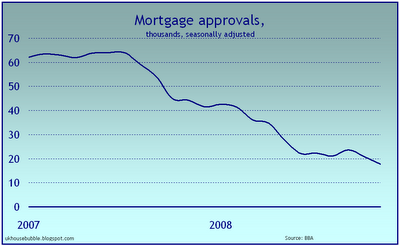
Und grob gerechnet werden in Kürze zwei Drittel der Bauarbeiter in dem Bereich arbeitslos sein.
Ich hatte angenommen, daß wenigstens in dem Bereich der Tiefpunkt erreicht gewesen wäre.
Der Pensionsfonds von Massachusetts hat im November 2008 $2 Mrd verloren, und insgesamt $16.1 Mrd in 2008:
The drop brings the assets under management in the fund, which is controlled by state Treasurer Timothy Cahill, to $37.6 billion, according to a memo from Stan Mavromates, the chief investment officer. He said the fund's emerging markets portfolio is leading the decline, falling 58.6 percent so far this year.
Das sind rund 30% seines Wertes.
When gasoline sales are excluded, the fall in overall retail sales is more modest: a 2.5% drop in November and a 4% decline in December. A 40% drop in gasoline prices over the year-earlier period contributed to the sharp decline in total sales.
[...]
Luxury goods, once considered immune from economic turmoil, were hardest hit, with sales falling 21.2%, compared with a jump of 7.5% a year ago, when the economy had just begun to sputter. Including jewelry sales, the luxury sector plunged by a whopping 34.5%.
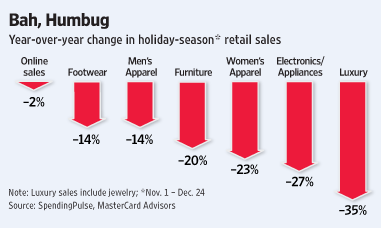
Das "once considered immune" erinnert mich an einen Artikel von Mike Shedlock von vor einem Jahr:
Things that can't happen, are about to.
"Dinge, die nicht passieren können, passieren bald".
Daß der amerikanische Verbraucher sich auf das Lebenswichtige beschränkt, ist eine dieser Sachen.
Der Artikel visualisiert interessante Teile aus dem "Z.1 Flow of Funds Accounts of the United States for the Third Quarter 2008" (>120 Seiten und nicht wirklich gut lesbar, IMO).
Die erste Graphik faßt die "Wertentwicklung" der privaten Haushalte und "nonprofit"-Organisationen von 2003 an zusammen: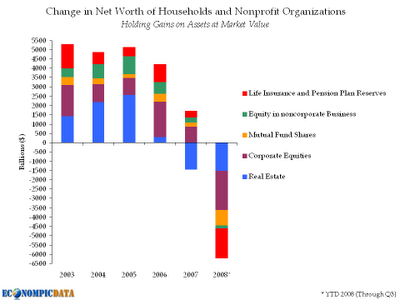
Die Zweite schlüsselt das für 2007 und 2008 quarteilsweise auf: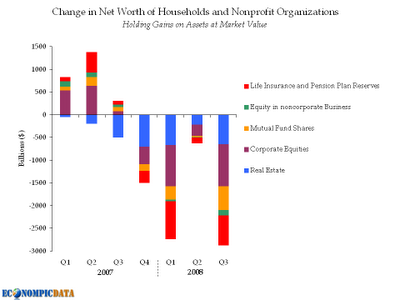
Die dritte Graphik zeigt, wie sich die Kredite entwickelt habe: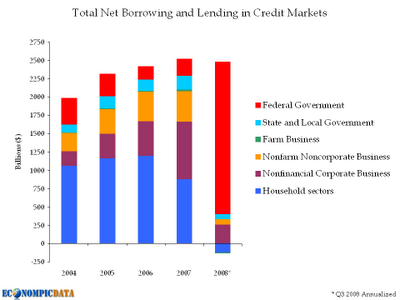
Die privaten Haushalte haben in 2008 insgesamt Schulden abgebaut, die anderen Bereiche insgesamt signifikant weniger Kredit aufgenommen, aber der US-Staatshaushalt hat das alles insgesamt fast "ausgeglichen".
Credit Crunch? Ja, aber nicht für den Staat. Noch nicht?
“Although the government has pledged to boost consumption to sustain growth, we still face difficulties in identifying which areas and which measures we should take to spur spending,” Zhou told a conference in Beijing today. Economic policies have failed to rebalance growth away from trade and investment, with the share of consumption in gross domestic product falling to less than 50 percent from 60 percent a decade ago, he said.
Mit anderen Worten: genau nichts ist geschehen, und genau 0 Pläne existieren.
Ansonsten hat der Artikel ein paar deutliche Zahlen über die Entwicklung der Binnennachfrage Chinas:
Dienstleistungsanteil am GDP, 43% in 2004 -> 40% oder weniger in 2008.
Konsumanteil am GDP, 60% ein Jahrzehnt zurück -> weniger als 50% heute.
(beide Bereiche überlappen).
Chinas Haushalte haben 20 Trillion Yuan auf den Banken, und nur 3.7 an Schulden.
Das wäre ein echtes Pfund, wenn die Summe nicht so lausig niedrig wäre für ein Milliardenvolk: Das sind, wenn ich mich nicht vertan habe, gerade mal 1800 Dollar pro Person. Das ist nicht so viel, daß es leicht fiele, die Leute zum verkonsumieren zu bringen.
Davon abgesehen ist natürlich auch noch fraglich, ob die auf Amerika und Europa getrimmte Produktion schnell auf attraktive Produkte für den chinesischen Markt umstellen kann.
Im Leben nicht.
The number of new housing units to be delivered this year may fall to 28,000 from an expected 34,000 because of operational delays at some contractors, the Dubai, United Arab Emirates-based newspaper said, citing Nasser Bin Hassan al-Shaikh, director general of the department. Units delivered in 2009 won’t exceed 32,000, it said.
Wie schön - aber 28000 bis 32000 neue Wohnungen auf einen Markt im freien Hauspreisverfall zu liefern ist, gelinde gesagt, kein Weg um den Preisverfall zu stoppen.
Real estate projects under way in Dubai aren’t likely to be stopped due to the credit crunch although there may be a delay in the announcement of some new projects on which construction hasn’t started, the newspaper said.
Alles, was ich in Dubai: Nachrichtenübersicht bereits schrieb, spricht dagegen: Hypothekenbanken, die keine Hypotheken mehr geben, Trump Towers, die auf unbestimmte Zeit verschoben werden, Überdenken von bereits angekündigten Häuslebauprojekten...
Im Angesicht wegbrechender Einnahmen ist das wagemutig und kein Zeichen von Stärke. Es mag richtig sein, aber trotzdem ist es ein Zeichen von Schwäche.
Die Nachricht, daß der pakistanische Aktienmarkt wieder aktiv ist, ist mir glatt entgangen. Dabei ist er durchaus der Beachtung wert:

Nicht lange, und er steht da, wo er ohne die fast dreimonatige "Schließung" auch gestanden hätte.
29% alleine in diesem Monat...

Ein durchaus beeindruckender Absturz: 20600 auf 4572.
[...]
U.S. authorities pulled the certification of the plants as part of an accord with Mexico, said Marco Antonio Sifuentes, a spokesman for the Latin American country’s Agriculture Ministry. Any plant that fails on three consecutive occasions to meet sanitary and quality standards automatically loses its right to export, he said by telephone from Mexico City.
30 US-Schlachthöfe dürfen nicht mehr nach Mexiko exportieren, weil sie hygienische oder Qualitätsstandards nicht eingehalten haben.
Liebe USA: Es ist ja richtig, daß die nicht mehr exportieren, aber warum dürfen sie denn überhaupt noch schlachten?
South Korea’s economy will expand 2 percent, the slowest pace in 11 years, in 2009 as the deepening global recession cools demand at home and abroad, the central bank said on Dec. 12. The economy last contracted for two consecutive quarters in 1998, and Lee’s comments come after he pledged last week to ensure growth next year.
[...]
Exports of goods will rise 1.3 percent, slowing from an estimated 3.6 percent gain in 2008, the central bank forecast in its 2009 outlook. The nation targets exports of $450 billion next year, the Minister of Knowledge Economy said yesterday, trimming its November forecast of $500 billion.
Das klingt ja schlecht, ist aber immer noch reichlich optimistisch, wenn es stimmt, was ich in Exporte von Südkorea und Taiwan im freien Fall zitierte, nämlich 20% Rückgang der Exporte.
“Ideally, the four companies should come together as one,” Yukio Sakamoto, chief executive officer of Tokyo-based Elpida, said in an interview after confirming the discussions with Powerchip, Rexchip Electronics Co. and ProMOS Technologies Inc. He declined to elaborate on details of the negotiations.
Japanisch-Taiwanesische Mikroelektroniksuppe, wohl bekommt's.
The Japanese chipmaker, which in November reported its fourth straight quarterly loss, may have an operating loss of 120 billion yen to 140 billion yen ($1.55 billion) in the year ending March 2009 if DRAM prices don’t rebound, Sakamoto said.
Elpida: Voraussichtlicher Verlust im 03-2009 endenden Geschäftsjahr: $1.55 Mrd, nach bereits 4 Verlustquartalen.
http://news.cens.com/cens/html/en/news/news_inner_25770.html:
People familiar with the company`s application plan pointed out that the company would seek a financial aid of around NT$100 billion (US$3 billion at US$1: NT$33), with NT$40 billion planned each for the company itself and ProMOS Technologies Inc. and the remaining NT$20 billion (US$606 million) for Rexchip Electronics Corp.
Und ein Bailout für die drei Unternehmen aus Taiwan in der Größenordnung von $3 Mrd klingt auch nicht danach, als wären das gesunde Unternehmen...
Apropos Powerchip:
http://www.pcmag.com/article2/0,2817,2337463,00.asp
Geplante Produktion im Dezember: 20 bis 25% weniger als vor dem September. Reiner Wahnsinn...
The net loss more than doubled to $706 million, or 91 cents a share, Boise, Idaho-based Micron said today. Analysts surveyed by Bloomberg had estimated a loss of 45 cents a share. Sales sank 8.7 percent to $1.4 billion in the period, which ended Dec. 4.
The report marks Micron’s eighth consecutive quarterly loss as chipmakers battle falling prices and shrinking demand in the recession. The company wrote down $369 million in inventory that had lost value. Even today’s rock-bottom prices for dynamic random access memory, the main memory in personal computers, are failing to entice buyers, said Gary Hsueh, an analyst at Oppenheimer & Co. in San Francisco.
8 Verlustequartale in Folge. $706 Mio Quartalsverlust, Verkäufe in Höhe von $1400 Mio.
Laut http://finance.yahoo.com/q/ks?s=MU haben die noch $1.03 Mrd. Cash.
Zum Ausblick dieser erfolgsversprechenden Branche:
-16% weltweit in 2009.
Nach Angaben der Pressestelle des Kabinetts in Moskau hatte sich die Regierungskommission für Schutzmaßnahmen im Außenhandel und für die Zoll- und Tarifpolitik für die Abschaffung des bislang gültigen fünfprozentigen Ausfuhrzolls auf Nickel ausgesprochen. Zudem solle auch der zehnprozentige Ausfuhrzoll auf Kupfer-Kathoden auf Null reduziert werden.
Die Senkung der Zölle sei notwendig, weil die Weltmarktpreise für Kupfer und Nickel in letzter Zeit spürbar zurückgegangen seien, heißt es in der Mitteilung.
"Null-Ausfuhrzoll" ist ja ein denkwürdig schönes Wort, nicht?
Uwe Ohse, 2008-12-27
Instead, entire networks of surveillance cameras are being effectively put on auto-pilot, with police reviewing tapes only after a reported incident.
While in some areas, members of the public and police community support officers are being drafted in fill the breach.
Now critics have called for a review of the future of CCTV surveillance which has cost taxpayers £500 million over the last decade, saying there is little point in having the cameras if no one is watching.
Wegen Geldmangels werden in Großbritannien die Überwachungskameras, explizit angeschafft zur Verbrechensvorbeugung, nicht mehr dauernd beachtet, sondern die Aufzeichnungen werden erst kontrolliert nachdem ein Verbrechen geschehen ist.
10 Tage zu spät, aber trotzdem:
Toys "R" Us hat den Laden am Times Square für 134 Stunden am Stück geöffnet gehabt.
Ich frage mich ja: Was erreicht man damit?
Nichts neues: Cantarell ist auf dem absteigenden Ast weit fortgeschritten.
Aber das muß ich übersehen haben:
Normalerweise ist Simmons nicht weit von den Fakten weg.
Und bei Mexiko macht der Ölexport 40% des Budgets aus. Das ist kaum kompensierbar.
Unfortunately, it may be too little too late to replace the rapidly disappearing Cantarell production. In as little as 12-24 months, the effects may be felt both in Mexico and the US. Replacing the 1.3 million barrels per day the US now imports from Mexico won’t be easy (the US imports 1.4 million barrels per day from Saudi Arabia by means of comparison). For Mexico, the problems run much deeper, as they must quickly diversify their economy or face wrenching economic and social dislocations. The adjustment period will likely bring great change and tumult, perhaps across the border as well.
Ach? Too little too late ist es allemale, bzw. war es sogar schon 2005, als "Twilight in the desert" erschien. Bis ein bereits gefundenes Ölfeld tatsächlich in Produktion geht, vergeht bei Tiefseebohrungen knapp ein Jahrzehnt. Und finden muß man die Ölfelder ja auch noch...
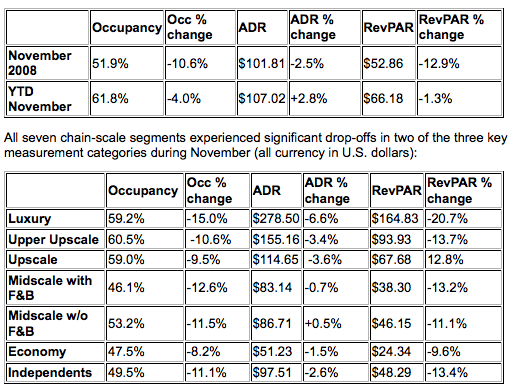
Diesmal nach Hotelkategorien aufgeschlüsselt - und die Ergebnisse sind durch die Bank grottenschlecht (die +12.8% RevPAR bei "Upscale" sind sehr wahrscheinlich ein Fehler, das Vorzeichen fehlt).
Ich hatte erwartet, daß es insgesamt die oberen Zimmerklassen deutlich stärker trifft - daß das nicht so ist bedeutet wohl, daß Geschäftsreisen nicht im Komfortgrad gekürzt werden, sondern ganz gestrichen werden.
- ADR –> Average Daily Rental income per occupied room
- RevPAR –> Revenue Per Available room
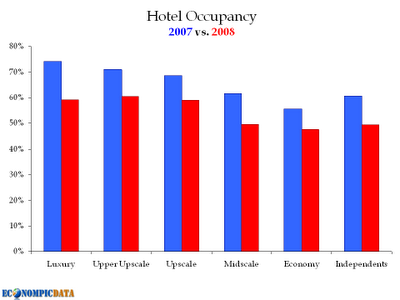
Nicht gut...
…. in Ukraine.
Die zweite große Depression ist da: In der Ukraine.
Die Bilder zeigen die Entwicklung der Industrieproduktion in der Ukraine heute und die in den USA 1928-33.
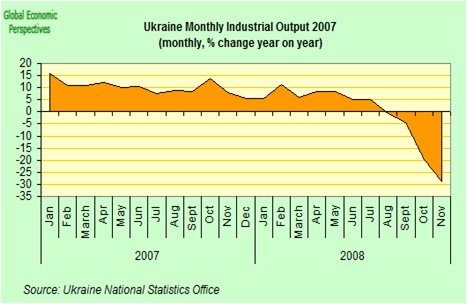
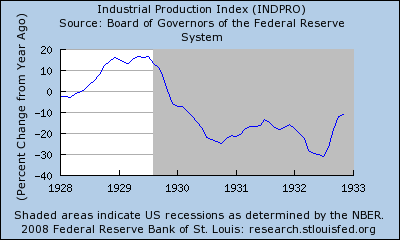
http://fistfulofeuros.net/afoe/economics-and-demography/as-the-politicians-battle-it-out-ukraines-economy-tunnels-south-in-search-of-australia/:
Dieser durchaus lange Artikel beschreibt die Situation in der Ukraine gut. Titel: "As The Politicians Battle It Out Ukraine’s Economy Tunnels South In Search Of Australia" (Während die Politiker kämpfen, baut die Ökonomie einen Tunnel auf der Suche nach Australien).
Kämpfen tun die Politiker jedenfalls - und zwar gegeneinander. Die Geschichte alleine ist schon lesenswert.
Die Zahlen zur Ökonomie:
13% Zoll (temporär) auf alle Wareneinfuhren - zusätzlich.
1% Maximales Staatsdefizit (Bedingung für den IMF-Kredit), geplant waren ~2.
50% Abwertung gegenüber dem Dollar seit Juni.
33 Mrd Dollar Währungsreserven
31.4 Mrd Dollar Mindestwährungsreserven (Bedingungen für ...)
<2 Mrd Spielraum für Währungsintervention (die aber politisch trotzdem gewünscht ist) und sonstiges.
2 Mrd Gasrechnung offen.
74% Aktienkursverfall in 2008.
22% Leitzins.
60% der auf ausländische Währungen laufenden Hypotheken und Kredite sind gefährdet.
105 Mrd. Dollar Staats- und Firmenschulden.
31% muß man für einen CDS auf die Ukraine zahlen.
4.1 Mrd müssen ukrainische Firmen alleine in 12/2008 zurückzahlen (Refinanzierungen sind wohl nicht mehr erhältlich)
53% der Firmenkredite sind in Dollar notiert.
-19.8% Industrieproduktion im Oktober (gegenüber Oktober 2008).
-28.5% Industrieproduktion im November (gegenüber November 2007).
Ich hab' mal eine Frage an den IMF: Welchen Wert hat eigentliche eine Währungsreserve, die man nicht verwenden darf? Doch 0, oder?
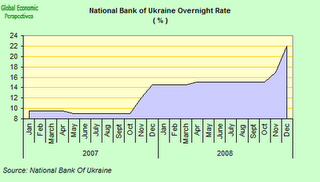
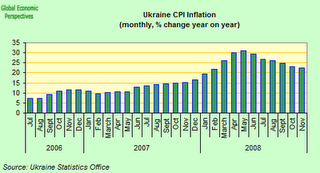
Und das sind nur die kurzfristigen Schwierigkeiten. Die wirklichen Probleme sind langfristig, _sehr_ langfristig: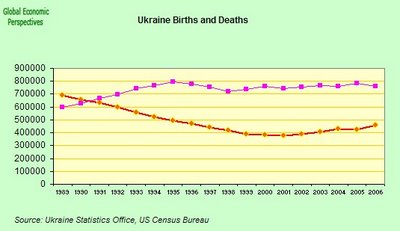
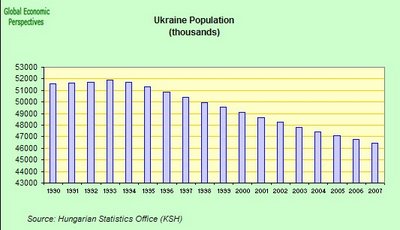
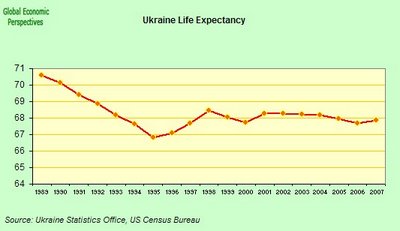
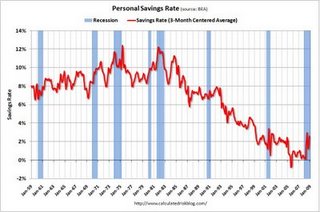
Die Sparquote ist zwar immer noch sehr niedrig, aber die Tendenz läßt doch klar erkennen, daß der hemmungslose Konsum vorbei ist.
Industrieproduktion -8.1%, Oktober auf November, nach -3.1% von September auf Oktober.
Haushaltsausgaben -0.5% nach -3.8%.
Neuer Rekord beim Produktionsrückgang: So schlimm war\'s noch nie.
Retail sales slid 0.9 percent from a year earlier, the biggest drop in 16 months, the Trade Ministry said today. Weaker personal spending is prompting retailers to reconsider investments.
Löhne -1.9% (Bezugszeitraum unklar),
Einzelhandel -0.9% über ein Jahr.
Da sind die Hypothekenzinsen in den USA doch so richtig schön gefallen - aber nützt das wirklich so viel wie zu wünschen wäre?
Nein, denn die Banken lehnen Refinanzierungswünsche meist ab:
...
In South Florida, four in 10 homeowners who bought or refinanced over the past five years owe more on their home than it is worth, according to sales and mortgage data analyzed by Zillow.com ... Many of them chose adjustable-rate loans and other expensive mortgages because that was the only way they could afford the payments.
Es wäre interessant zu wissen, wie viele Hypotheken tatsächlich an Libor oder Leitzinssatz gekoppelt sind und wie viele es nicht sind. Insgesamt ist der Hypothekenmarkt in den USA leider _sehr_ unübersichtlich.
...
Before LaPenta begins processing an application, he said he makes sure customers are aware of the essential criteria needed to refinance: 20 percent equity in the property, a homestead exemption, a credit score of 700 or higher, a mortgage debt-to-income ratio of no more than 45 percent and the ability to fully document income and assets.
Egal was Bush und Co. angepackt haben: Es kam nie wirklich da an, wo es nötig gewesen wäre.
GMAC ist nun eine Bank.
financial markets, and all other facts and circumstances, the Board has determined
that emergency conditions exist that justify expeditious action on this proposal in
accordance with the provisions of the BHC Act and the Board\'s regulations.
Soso, unübliche und ernste Umstände und andere Tatsachen und Umstände rechtfertigen schnelle Handlung...
financing, insurance, and other activities both in the United States and abroad. GMAC Bank has total consolidated assets of approximately $33 billion and controls deposits of approximately $17 billion. GMAC Bank engages primarily in lending and other financing activities and taking deposits of the type that are permissible for an industrial loan company under the exception in
section 2(c)(2)(H) of the BHC Act.
Also gehen von den 211 Mrd. Assets von GMAC 50 Mrd. in die GMAC Bank ein. Hm. Was ist mit dem Rest?
GM wird seinen Anteil an GMAC auf weniger als 10% bringen. Der Rest geht an einen Treuhänder, der diese Anteile binnen drei Jahren abstoßen soll.
Cerberus hingegen wird seine Anteile einfach an die Investoren geben.
Cerberus wirft das Handtuch...
Da fordert jemand, das Steuersystem der USA von \"freundlich für den Finanzsektor und schlecht für den produzierenden Bereich\" praktisch 180° zu drehen. Darf man das? Darf man in den USA wirklich so böse zur Finanzbranche sein? Gerade wenn man Boss von Fedex ist? Müßte man den nicht als Aufsichtsrat sofort feuern, weil der einem die Kunden aus der Finanzbranche vergrault?
Allen Sarkasmus außen vor lassend: In der Tat, das ist eine weitere und gerne übersehene Ursache des Problems.
Auch die Einsicht, daß Stimuli nicht so viel bringen, weil die Leute in schwierigen Zeiten diese Stimuli zur Schuldenreduktion verwenden, ist nicht so falsch.
An so einem schönen Titel kann ich nicht vorbeigehen... \"Ladendiebe der Welt, vereinigt euch\".
A
Shoplifting arrests across the country are 10% to 20% higher this year than last, according to latest reports. A recent New York Times article pointed out that the numbers might be even higher, however, since shoplifters are often banned from stores rather than arrested. Overall, it’s a sad indicator of the recession - but one that predictably highlights how, in our shopping-mad culture, people would rather steal than suffer a gift-less holiday season.
Ladendiebstähle plus 10-20% - und das obwohl Ladendiebe oft nur Hausverbot bekommen statt Anzeigen.
An sich ist der Anstieg ja noch moderat, aber in Anbetracht der Tatsache, daß die Umsätze ohnehin zurückgegangen sind, könnte das schon deutlich weh tun, und _eigentlich_ sollte bei den in diesem Weihnachtsgeschäft gesehenen Preisnachlässen der Anreiz zum Diebstahl ja eher gering sein...
Hier zur Abwechslung mal etwas, das rein gar nichts mit Finanzkrise oder Klimawandel zu tun hat:
"If a situation arises where there has to be 18 hours of load shedding a day, the country will collapse," he said. "Political speeches will be of no use then. It will also affect the peace process."
The only solution to the problem is to bring diesel generators and install them at different places. "We will then be able to bring load shedding down to six or seven hours a day in three months," he said.
The government will call for private sector cooperation and tell them to install diesel generators within a fixed time, then the state will give whatever facilities are needed.
Nepal hat ein ziemlich bedrohliches Problem mit der Stromversorgung, und schaltet mehr oder weniger regelmäßig den Strom ab.
Befürchtet wird, daß das im März/April für 18 Stunden am Tag geschehen muß (was dann in etwa das Niveau von Bagdad in den schlimmsten Zeiten hat). Dieselgeneratoren sollen Abhilfe bringen und helfen, die Abschaltung auf 6 bis 7 Stunden zu reduzieren...
Und woran liegt's? Schwer zu sagen - sicherlich mit an allgemeiner Inkompetenz bzw. Kleinkrieg zwischen Regierung und Opposition (das schimmert durch den Artikel durch, sozusagen), veralteten Stromleitungen nach Indien (so daß man nicht einfach von da etwas einkaufen kann), und wohl auch nicht wirklich attraktiven Strompreisen (es hat sich einfach nicht gelohnt, Kraftwerke zu bauen).
Production dropped to 2.711 million barrels a day, from 2.901 million barrels a day a year earlier, the company known as Pemex said today on its Web site. In an e-mail, Pemex cited Cantarell, its largest field, as the reason for the drop.
[...]
Cantarell’s output fell 33 percent, more than twice as fast as government estimates, to 862,060 barrels a day from a year earlier. Declining pressure at Cantarell has made it more expensive and harder to continue pumping oil from the offshore deposit.
[...]
Oil exports fell 20 percent to 1.511 million barrels a day, according to a chart on Pemex’s Web site.
Mexiko:
Ölproduktion: -6.5%.
Ölexport: -20%.
Ölproduktion von Cantarell, dem mexikanische Riesenölfeld, alleine: -33%.
20% weniger dürften ein riesiges Loch in die Kasse reißen - zusammen mit dem Ölpreis dürfte das die mexikanische Wirtschaft etwas ins Schwitzen bringen.
Wollen Sie den Digest abbestellen?